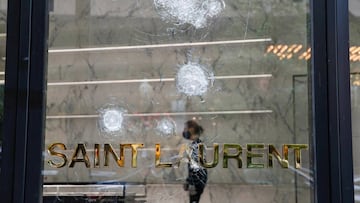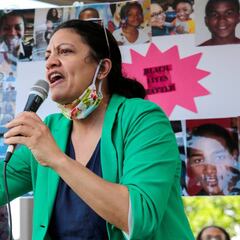Police shooting leads to looting, arrests in Chicago’s busiest shopping district
A police shooting sparked outrage in Chicago on Monday leading to looting and over 100 arrests with 13 officers injured during the unrest.

Chicago’s upmarket Magnificent Mile shopping district was a scene of destruction on Monday morning after hundreds of people smashed windows and looted stores in response to a violent altercation between police and a local resident.
Official reports state that Chicago police received a call around 2:30am Monday about an individual with a gun in the Englewood neighborhood on the city’s South Side. A chase ensued when officers spotted 20-year-old Chicago resident Latrell Allen, who allegedly fired on police as they pursued him. The officers returned fire, striking Allen multiple times. He was taken to University of Chicago Medical Center, where he is currently in stable condition.
No bodycam footage to support police claims
Hundreds of people looted high-end shops in downtown Chicago overnight and early Monday morning. Law enforcement officials say it was linked to social media posts after police shot and injured a male suspect Sunday afternoon on the city's South Side. https://t.co/nqejYZAHyH
— NPR (@NPR) August 10, 2020
As of Monday evening, no police body camera footage has been made available to support the police department’s account. The Civilian Office of Police Accountability, an independent agency, is investigating the matter and is seeking security and cell phone footage from Englewood businesses and residents.
The unclear details of the altercation reached the public via social media, where a rumor spread that police had shot a 15-year-old child. The erroneous report fueled a flurry of messages urging people to gather downtown, where chaos ensued. Luxury retailers Coach, Burberry, Louis Vuitton, Neiman Marcus, and others had their windows smashed, with looters carrying out armfuls of goods that they placed in waiting vehicles. A Tesla dealership and an Apple store were also looted as the mayhem spread north to the Old Town neighborhood.
Hundreds of police officers were dispatched to the scenes of the looting, where they spent several hours making arrests. By daybreak, authorities reported that more than 100 civilians had been arrested, thirteen officers were injured and five guns had been recovered. A civilian and a private security guard were shot and wounded during the unrest and both are reported to be in critical condition. It is unclear whether police or civilians were responsible for the shootings.
Lightfoot: looting "abject criminal behavior, pure and simple"
What we experienced this morning is not who we are.
— Mayor Lori E. Lightfoot (@chicagosmayor) August 11, 2020
We cannot let the actions of some destroy the fabric of our city and who we are as proud Chicagoans. pic.twitter.com/zK0acm1M1B
Speaking to the Chicago Tribune, Mayor Lori Lightfoot condemned the looting. “What occurred in our downtown and surrounding communities was abject criminal behavior, pure and simple,” she stated. “And there cannot be any excuse for it. Period.”
The Chicago chapter of activist group Black Lives Matter issued a press release in response, condemning both police violence and Mayor Lightfoot’s response. “Yesterday, Chicago police continually proved that they do not keep us safe — they only cause violence, and escalation after the fact,” the statement read. “…The people will keep rising up until the CPD is abolished and our Black communities are fully invested in. Contrary to Mayor Lightfoot’s position, Black lives are and always will be more important than downtown corporations who siphon Tax Increment Financing (T.I.F.) money, while avoiding taxes, and exploiting the labor of Black and Brown Chicagoans. These corporations have ‘looted’ more from our communities than a few protesters ever could, yet the Mayor reserves her anger for the latter.”
Related stories
Englewood, where the original altercation took place, has a poverty rate over 40 percent, one of the highest in Chicago. By contrast, the shopping district known as the Magnificent Mile, where the majority of the looting took place, is the safe and profitable home to dozens of high-end stores, attracting throngs of tourists from around the world every year.
On Monday evening, the City of Chicago announced that access to the downtown area would be restricted from 8pm–6am, allowing only residents, essential workers, and employees whose businesses are located there to have full access.

